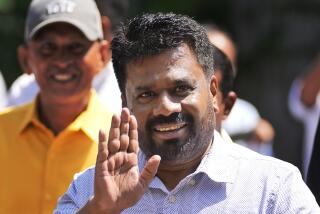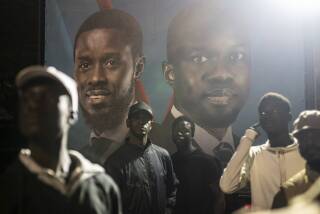Ruling Party’s Candidate Leads in Sri Lanka Voting
- Share via
COLOMBO, Sri Lanka — Prime Minister Ranasinghe Premadasa took the lead in presidential elections early today after gunmen tried to wreck the balloting with attacks on voting stations that left 15 people dead, officials said.
Results from 40 of 182 polling stations gave Premadasa 217,114 votes, or 51%, in Monday’s nationwide election, according to state television.
His chief rival, former Prime Minister Sirimavo Bandaranaike of the opposition Sri Lanka Freedom Party, polled 189,700 votes, or 42%.
Ossie Abeygoonesekera, head of a coalition of four small leftist parties, trailed with 16,976 votes.
All three candidates pledged to end ethnic strife that has brought this former tourist paradise off the tip of India to the brink of ruin.
“This is a battle between the ballot and the bullet. The bullet must not win,” Premadasa, of the governing United National Party, said after voting in the capital.
Violence by extremists from the majority Sinhalese, which also left 25 people wounded, failed to stop balloting, but an election official said the attacks and threats of violence dampened the turnout.
The attacks began after an India-brokered agreement 18 months ago--supported by outgoing President Junius R. Jayewardene--that promised minority Tamils regional autonomy in the north and east and introduced Indian troops to help disarm the rebels.
State television said 40% to 50% of the country’s 9.3 million electorate voted, compared to 80% in the presidential election six years ago.
The Marxist People’s Liberation Front, a group of Sinhalese extremists opposed to the peace settlement with the Tamils, had vowed to kill anyone who voted.
All of the presidential candidates are Sinhalese, a predominantly Buddhist group that makes up 75% of Sri Lanka’s 16 million people. Tamils, who are Hindu and total 18% of the population, claim discrimination by the Sinhalese.
Premadasa campaigned as a champion of the poor and promised monthly allowances equivalent to $75 for the poorest families.
He and Bandaranaike, who was prime minister in 1960-66 and 1970-77, oppose the agreement with India under which 47,000 Indian troops are in Sri Lanka.
More to Read
Sign up for Essential California
The most important California stories and recommendations in your inbox every morning.
You may occasionally receive promotional content from the Los Angeles Times.












